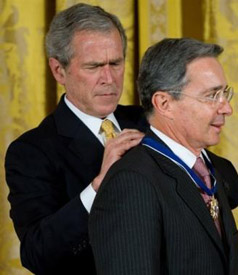Colombia Spied on Judges, Lawmakers and Media

The jaw-dropping abuses in Colombia just never seem to let up under President Alvaro Uribe. Of course, all the analysis and discourse in the US automatically takes Uribe at his word, that these are "rogue" agents. If it was one of the "bad left" countries of the region, best believe there'd be no such deference and silence from the media and US Govt.
BOGOTA (AFP) — Colombia's intelligence service was at the center of a political storm Monday, following revelations it spied on judges, politicians and journalists, forcing President Alvaro Uribe to deny he had ordered the move.
The revelations in the Colombian magazine Semana prompted the resignation of the Department of Administrative Security (DAS) deputy director Jorge Alberto Lagos, and may lead to further high profile departures.
"I have never given a single order to monitor these people's private lives," Uribe said Monday.
As well as lawmakers, judges and reporters that were considered political opponents to the Uribe administration, some officials close to the government were also spied on, according to the magazine.
The recordings were beginning to be destroyed in January, according to Semana.
Uribe blamed the illegal eavesdroppings on a group of DAS officials, describing them as a "mafia gang" that hoped to hurt
Colombian democracy.
Since 2002, at the outset of the Uribe government, the DAS has been the target of numerous accusations for alleged links to right-wing paramilitary groups, and for accusations it spied on opposition figures.

2 Comments:
Another restriction you supported falls in Havana:
"The public reading last week of a selection from Orlando Pardo's new book, "Boring Home," at the Havana Book Fair marked the first time in 50 years that Cuban authorities allowed a reading from a book not approved by the state."
Would you like to tell us what other restrictions the government should lift that you might support?
Hey, if you're interested in U.S.-Latin American affairs, you should really check out the new NACLA Report: Legacies of Revolution in the 21st Century – which is out now.
Here's an excerpt of the description:
Motivated by the 50th anniversary of the Cuban Revolution, and the fact that it has been nearly a century since the Mexican Revolution, 50 years since the National Revolution in Bolivia, 30 years after Nicaragua, and 10 years of Bolivarian Revolution; the March/April 2009 issue of the NACLA Report on the Americas titled: “Revolutionary Legacies in the 21st Century”; examines the enduring legacies of revolution in Latin America.
The March/April NACLA Report offers reflections on the notion of patria in the Castro’s vision of the Cuban Revolution, Mexico’s tensions over its revolutionary past, Ortega’s betrayal of the Sandinista revolution, the revolutionary imagination in Venezuela and much more from a select group of academics, authors and analysts.
You can browse the new issue online – http://www.nacla.org/currentissue
Also if you want,
Subscribe to NACLA Report on the Americas – https://nacla.org/nacla/articles/subscribe!
NACLA Report on the Americas has been published for the last 41 years by the North American Congress on Latin America, an independent nonprofit institution dedicated to analyzing political, social, and economic trends in Latin America and the Caribbean, as well as U.S. policy in the region.
Find out more about NACLA - nacla.org
Hope this information was useful, enjoy!
Post a Comment
Subscribe to Post Comments [Atom]
<< Home